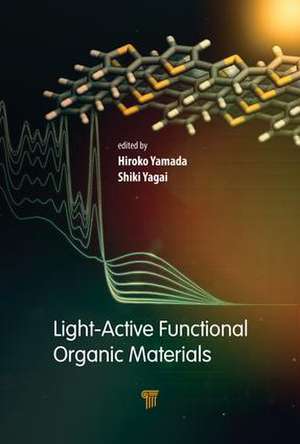Light-Active Functional Organic Materials
Editat de Hiroko Yamada, Shiki Yagaien Limba Engleză Hardback – 16 mai 2019
This book overviews some of the cutting-edge p-conjugated molecular and polymer materials for organic photovoltaics, artificial photosynthesis, and organic light-emitting devices. It gives insights into the interactions between light and molecules and discusses sophisticated molecular designs, self-assembly and self-organization strategies, and state-of-the-art unconventional analytical methods.
Preț: 838.34 lei
Preț vechi: 1022.36 lei
-18% Nou
Puncte Express: 1258
Preț estimativ în valută:
160.44€ • 166.88$ • 132.45£
160.44€ • 166.88$ • 132.45£
Carte tipărită la comandă
Livrare economică 14-28 aprilie
Preluare comenzi: 021 569.72.76
Specificații
ISBN-13: 9789814800150
ISBN-10: 9814800155
Pagini: 236
Ilustrații: 12 Tables, black and white; 22 Illustrations, color; 101 Illustrations, black and white
Dimensiuni: 152 x 229 x 18 mm
Greutate: 0.5 kg
Ediția:1
Editura: Jenny Stanford Publishing
Colecția Jenny Stanford Publishing
ISBN-10: 9814800155
Pagini: 236
Ilustrații: 12 Tables, black and white; 22 Illustrations, color; 101 Illustrations, black and white
Dimensiuni: 152 x 229 x 18 mm
Greutate: 0.5 kg
Ediția:1
Editura: Jenny Stanford Publishing
Colecția Jenny Stanford Publishing
Public țintă
Academic and Professional Practice & DevelopmentCuprins
1. Soft Materials: Ultra-Flexible, Fluidic, Optoelectronically-Active Molecular/Polymeric Materials 2. Rigid–Flexible Hybrid Design for Photofunctional Molecules and Materials 3. Optical Microresonators from π-Conjugated Polymers 4. Hydrogen-Bond-Directed Nanostructurization of Oligothiophene Semiconductors for Organic Photovoltaics 5. Fundamental Optoelectronic Process in Polymer–Fullerene Heterojunctions 6. Hard Materials: Near-Infrared Dyes Based on Ring-Expanded Porphyrins with No Meso-Bridges 7. Gold Isocyanide Complexes Exhibiting Luminescent Mechanochromism and Phase Transitions 8. Thermally Activated Delayed Fluorescence (TADF) Materials for Organic Light-Emitting Devices 9. α-Diketone-Type Precursors of Acenes for Solution-Processed Organic Solar Cells 10. Photochemical Synthesis of Phenacenes and Their Application to Organic Semiconductors
Recenzii
"The book presents current reviews on a wide range of organic materials having in common their response to or production of light. It focuses on the challenge of making a flexible material with good optoelectronic properties and explores hybrid rigid/flexible systems. It reviews optical microresonators, nanostructure-based organic semiconductors, polymer/fullerene interfaces, near-infrared dyes, and luminescent gold isocyanide complexes, along with LEDs based on thermally activated delayed fluorescence, which promise to approach the efficiency of more expensive inorganic LEDs. Lastly, it discusses the progress with acenes and phenacenes (large aromatic molecules used to develop organic semiconductors). The book authors, who are all active principal investigators in Japan, have presented a well-written text that is generously illustrated throughout." - Prof. L. C. Davis, CHOICE
Notă biografică
Hiroko Yamada is full professor at Nara Institute of Science and Technology (NAIST), Japan. She received her PhD from Kyoto University, Japan, in 1992. She joined Ehime University, Japan, as associate professor in 2003 after working in Ciba-Geigy Japan Ltd. and as a postdoc in Osaka University, Japan. She moved to NAIST in 2011 and was promoted to the rank of full professor in 2012. Prof. Yamada was also a PRESTO researcher of JST during 2006–2009 and has received the Japanese Photochemistry Association Award (2012) and the Chemical Society of Japan Award for Creative Work (2018). Her research areas are organic chemistry, organic photochemistry, and organic electrochemistry.
Shiki Yagai is full professor at Chiba University, Japan. He received his PhD from Ritsumeikan University, Japan, in 2002. He joined Chiba University as assistant professor soon after and subsequently became an associate professor in 2010. He was promoted to the rank of full professor in 2017. Prof. Yagai was a PRESTO researcher of JST during 2006–2009 and was awarded the Chemical Society of Japan Award for Young Chemists (2010), Young Scientist Commendation for Science and Technology from the Minister of Education, Culture, Sports, Science and Technology (2011), and Swiss Chemical Society Lectureships (2017). His current research focuses on supramolecular functional materials.
Shiki Yagai is full professor at Chiba University, Japan. He received his PhD from Ritsumeikan University, Japan, in 2002. He joined Chiba University as assistant professor soon after and subsequently became an associate professor in 2010. He was promoted to the rank of full professor in 2017. Prof. Yagai was a PRESTO researcher of JST during 2006–2009 and was awarded the Chemical Society of Japan Award for Young Chemists (2010), Young Scientist Commendation for Science and Technology from the Minister of Education, Culture, Sports, Science and Technology (2011), and Swiss Chemical Society Lectureships (2017). His current research focuses on supramolecular functional materials.
Descriere
This book focuses on functional organic materials wherein interplay between light and organic molecules has an important role. It covers cutting-edge organic optoelectronic materials that can be applied to photovoltaics, artificial photosynthesis, and light-emitting devices.
